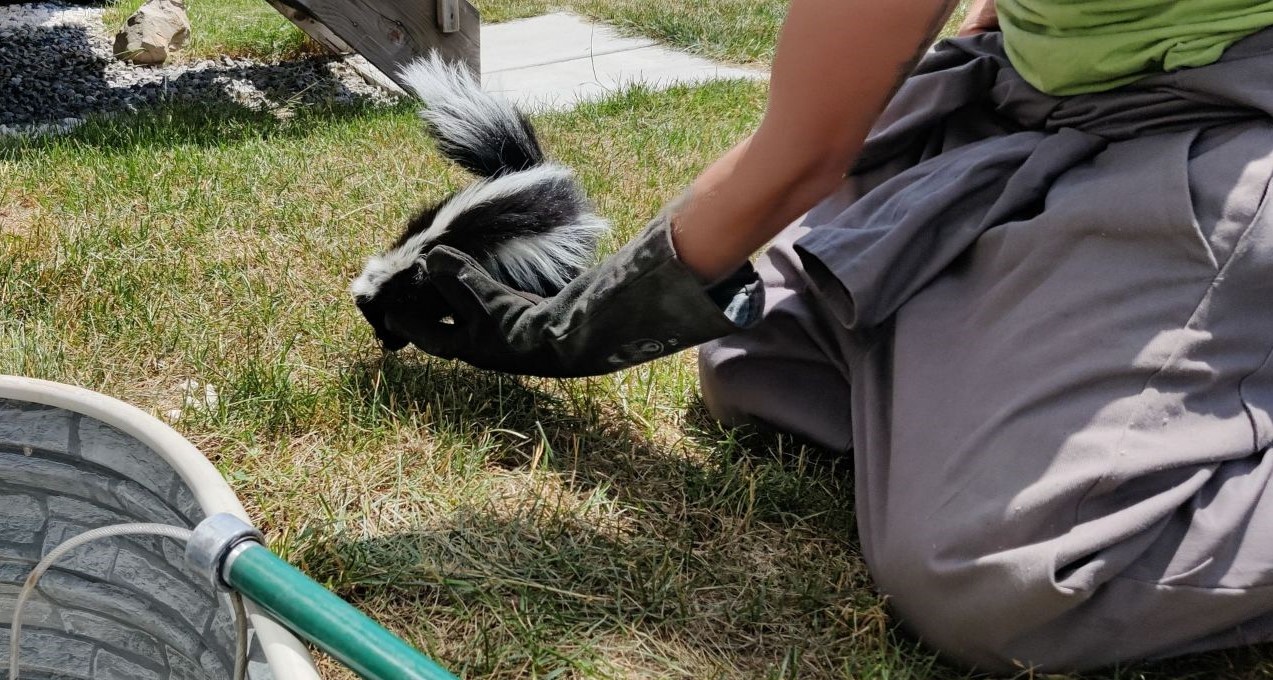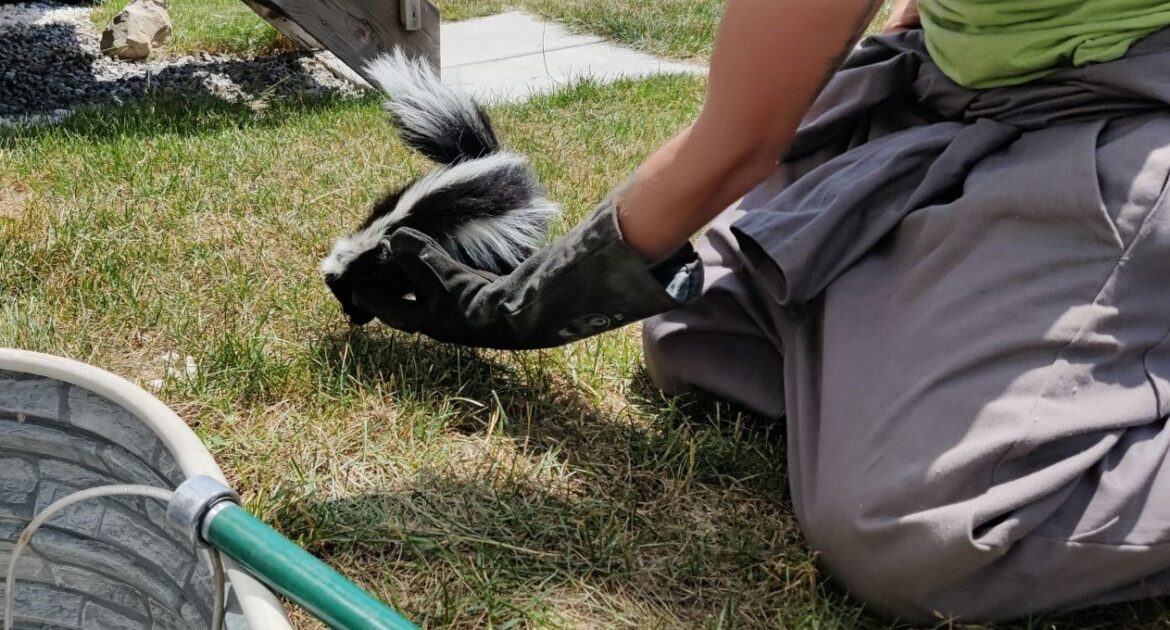Are skunks as unstoppable as their infamous spray makes them seem? While their odorous defence keeps many animals far away, skunks still have natural predators that aren’t fazed by their tactics.
Here in Niagara, some of these predators play a role in balancing the environment, but skunks can still thrive in a variety of habitats, like forests, fields, and even urban areas. If you’ve noticed more wildlife activity, you may wonder about skunk predators in Niagara and how they help control populations.
To answer the question simply, yes, skunks do have natural predators. Larger animals such as coyotes, foxes, and owls are some of the key skunk natural predators, both in Niagara and beyond. These predators are either clever enough to avoid getting sprayed or resistant to the strong odour.
However, these animals still manage to avoid many threats by using their wits and their built-in defence system. But if they make their way into your yard, it’s time to consider wildlife control for skunks.
That’s where we, at Skedaddle Humane Wildlife Control in Niagara, come in. Our team is here to help safely and humanely manage skunk problems while protecting your family and property.
Who Are Skunk Natural Predators?
Even though skunks’ spray is powerful, it doesn’t stop all predators. Some animals have learned how to hunt skunks without getting sprayed, while others don’t seem to mind the smell at all. Here’s a closer look at the most common predators in Niagara:
Mammals
- Coyotes and Foxes: Both coyotes and foxes are clever hunters who sometimes target skunks as a food source. These predators rely on their speed, timing, and wits to avoid the spray.
- Badgers: Known for their digging skills, badgers may go after skunks that live in burrows. They aren’t as common in Niagara as coyotes or foxes, as they are considered an endangered species, but they’re still a natural predator in North America.
- Dogs: While pets like dogs aren’t “natural” predators, they may unknowingly chase or attack skunks. This often results in an unpleasant encounter for both the dog and its owner.
Birds of Prey
- Owls: Great horned owls are one of the top predators for skunks. Equipped with sharp talons and excellent night vision, these nocturnal birds swoop in before the animal has a chance to spray. Additionally, owls don’t have a great sense of smell, so the stinky spray doesn’t bother them.
- Hawks and Eagles: Although less common than owls, some larger hawks and eagles may also hunt skunks if other prey is scarce.
Unexpected Predators
- Large Cats: Bobcats or lynxes, while rare in Niagara, might hunt skunks if they venture into their territory.
- Humans: It’s important to note that human activities, such as cars, are a significant danger to skunks in urban areas like Niagara. Although not a natural predator, human behaviour indirectly impacts skunk populations.
What Makes These Animals Effective Skunk Hunters?
The key to dealing with skunks lies in their predators’ strategies. Many skunk predators have specific traits or skills that help them succeed where others fail. Here’s what makes them effective hunters:
- Stealth and Speed: Animals like foxes, coyotes, and owls are quick, quiet, and don’t give the animal time to prepare its defence.
- Poor Sense of Smell: Owls have a poor sense of smell, meaning skunk spray doesn’t bother them the way it would distress other animals or humans.
- Clever Hunting Techniques: Some predators, like foxes, aim for the skunk’s head or back to avoid getting sprayed.
Why Are Skunk Predators in Niagara Important?
Having natural predators is vital for any species, and skunks are no different. Predators help keep the skunk population under control, ensuring they don’t overrun an ecosystem. For example, too many skunks in one area can lead to an increase in property damage, unpleasant odours, and even health risks from their droppings or the diseases they carry.
Here in Niagara, animals like coyotes, foxes, and owls enhance biodiversity by maintaining balance in the food chain. That said, urban areas can create challenges as they put people and skunks into closer contact.
While natural predators play their role in wilder environments, they often avoid human-populated areas, leaving wildlife removal a challenge for trained professionals like us.
Skunks in Niagara Homes and Backyards
Skunks are surprisingly adaptable and can thrive in both rural and urban settings. From wooded areas to your backyard garden, they make themselves at home in many places across Niagara. Common signs that a skunk is nearby include:
- Strong, lingering odours (particularly around dawn or dusk)
- Burrows or holes in your yard
- Tipped-over garbage cans
- Tracks in the soil
If a skunk finds shelter beneath a deck, shed, or porch, it may need intervention. While it might be tempting to handle the problem yourself, DIY techniques don’t work as well as people think. This is when professional wildlife control is crucial.
At Skedaddle, we use one-way doors to allow skunks to leave safely while preventing them from coming back in. Our approach avoids harmful trapping, making it effective and humane. Once the animal is gone, we take extra steps to secure the site and keep your home safe from future animal intrusions.
Coexisting with Niagara’s Wildlife
Even though skunks have natural predators and strategies in place to stay safe, they often escape these threats in urban areas. That’s why skunk populations can get out of hand when left unmanaged. To coexist peacefully while protecting your home, here are a few suggestions:
- Secure Food Sources: Skunks often raid garbage or pet food left outside. Use animal-proof lids or store items indoors.
- Lighting: Adding motion-sensor lights can make your property less attractive to nocturnal animals like skunks.
- Eliminate Hiding Spots: Seal off spaces under porches, decks, or sheds that could become skunk shelters.
- Work with Professionals: Utilize humane wildlife control methods (like our one-way doors!) instead of risky DIY tactics.
Call the Professionals at Skedaddle
Protecting both animals and people is at the heart of what we do. At Skedaddle Humane Wildlife Control in Niagara, our expert team ensures skunks are removed safely and humanely. We understand how to manage wildlife without harming them or putting families at risk.
If you suspect a skunk has settled near your home, don’t wait. These animals may avoid their natural predators, but they don’t stand a chance against our reliable one-way doors and exclusion methods.
When Skunks Become a Problem, We’re Here to Help
Skunk natural predators are an important part of managing skunk populations in the wild, but when these animals find their way around your home, the balance shifts. Skunks can create messes, spray unpleasant odours, and even damage property while they’re looking for food or shelter.
If these animals are getting too comfortable close to your space, don’t wait for skunk predators in Niagara to step in. That’s where we come in.
At Skedaddle Humane Wildlife Control in Niagara, we offer humane and effective wildlife control for skunks. Using our specialized one-way doors, we safely allow skunks to exit your property without giving them the option to return. This method not only protects your home, but it also keeps the animals safe, ensuring that every solution we provide aligns with their natural behaviours.
Dealing with skunks around your home isn’t just about addressing the immediate problem; it’s about ensuring long-term prevention. Our team is here to help you take care of the situation quickly and professionally, so you can enjoy a wildlife-free property.
Request an estimate today and learn how our humane techniques can protect your home while respecting the important role of skunk’s natural predators in Niagara’s ecosystem.




